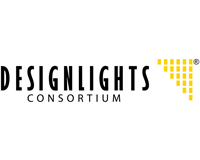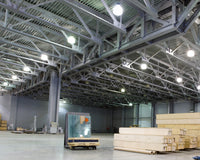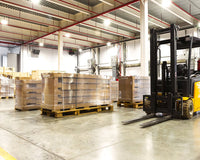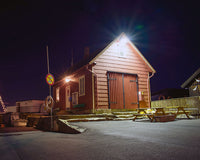If you're shopping for LED wall packs for your business or property, one detail that often gets overlooked is the lens material. But this small detail makes a big difference. The lens doesn't just protect the LED components; it also directly affects how well your light performs over time. At Revolve LED, our traditional wall packs feature tempered glass lenses, and that's not by accident, it's a deliberate choice grounded in quality, performance, and durability.
So, when it comes to LED wall packs, which lens material should you choose: tempered glass or polycarbonate? Let's break it down.
What Is a Wall Pack Lens and Why Does It Matter?
A wall pack lens isn't just a cover, it's a key component that shapes how light is distributed and protected. The right lens ensures optimal brightness, minimizes glare, and shields the LED components from weather, debris, and UV exposure. Impact on Light Performance:
- Beam Spread: The lens material affects how light disperses. Tempered glass provides consistent clarity, while polycarbonate can sometimes scatter light unevenly.
- Protection: Outdoor fixtures face rain, snow, dust, and even vandalism. A weak lens can crack or yellow, reducing efficiency over time.
When selecting the right lens, material matters. A poor-quality lens can degrade over time, yellow from sun exposure, or scratch easily, reducing light clarity and output. That not only affects performance, but also the fixture's lifespan and the appearance of your property.
For outdoor lighting like wall packs used on warehouses, commercial buildings, and security perimeters, the lens must hold up against heat, impact, and UV. That's why choosing the right lens material isn't just about aesthetics. It's a decision that directly impacts safety, maintenance, and cost over time.
Tempered Glass Lens: Features & Benefits
Let's talk tempered glass. This isn't your typical windowpane material. Tempered glass is heat-treated to be four to five times stronger than standard glass. It's manufactured through a controlled thermal process that strengthens its structure, so it can take a hit without shattering like ordinary glass.
Even if it does break, tempered glass crumbles into small, rounded pieces rather than sharp shards. That makes it a much safer option, especially in commercial or industrial areas where safety matters.
But strength is just one part of the story. Here's why tempered glass is often the preferred lens material in LED wall packs:
- Superior Scratch Resistance: Polycarbonate may be tough, but it's prone to scratching, especially in areas with wind-blown dust or debris. Tempered glass, on the other hand, maintains its clarity far longer. That means better light transmission and a cleaner look over the years.
- UV Resistance: One of the biggest complaints with polycarbonate lenses is that they tend to yellow or haze over time, particularly under constant sun exposure. Tempered glass is naturally UV-stable, it won't discolor, warp, or degrade when exposed to sunlight day after day.
- Heat Resistance: High-output LED wall packs can generate serious heat. Polycarbonate can warp or become brittle under extreme temperatures. Tempered glass holds strong, even in high-wattage applications or during summer heat waves.
- Aesthetic Appeal: Tempered glass just looks better. It has a sleek, high-end appearance that complements modern architecture and gives your fixtures a more professional, finished feel. That can make a real difference when lighting entryways, building exteriors, or customer-facing storefronts.
According to a 2022 report from the U.S. Department of Energy, lighting performance and material integrity are top factors in fixture longevity. Materials like tempered glass help maintain over 90% lumen output over a 5-year span, compared to only 70–80% in some polycarbonate-based systems.
H2: Polycarbonate Lens: Pros and Cons
Polycarbonate is a high-performance plastic that's earned a reputation in the lighting industry for being lightweight, durable, and practically unbreakable. It's the same material used in riot shields and airplane windows. so, yeah, it's tough. But is it the best option for LED wall packs? Let's weigh the pros and cons.
Benefits of Polycarbonate in Wall Packs
- Extreme Impact Resistance: If your wall packs are in high-vandalism areas (parking lots, alleyways), polycarbonate can stand without breaking. According to Plastics Technology, polycarbonate has 250x the impact resistance of standard glass.
- Lightweight & Easy to Install: Polycarbonate lenses are much lighter than glass, making them easier to handle during installation especially for large fixtures.
- Lower Cost: If budget is a concern, polycarbonate is lower cost than tempered glass, which can be appealing for large-scale projects.
Drawbacks of Polycarbonate
- Prone to Scratching: While it won't crack from impacts, polycarbonate scratches easily, leading to cloudy lenses over time.
- UV Degradation (Yellowing): Even with UV coatings, polycarbonate yellows after prolonged sun exposure, reducing light output. A DOE study showed that after 3-5 years, some polycarbonate lenses lost 10-20% of their light transmission.
- Heat Sensitivity: High-wattage LEDs generate heat, and polycarbonate can warp or deform under extreme temperatures. While tempered glass handles 470°F+, polycarbonate starts softening at just 280°F.
Tempered Glass vs. Polycarbonate: Key Comparisons
|
Feature |
Tempered Glass |
Polycarbonate |
|
Durability |
Highly scratch-resistant, maintains clarity for years |
Impact-resistant, clouds over time |
|
Safety |
Shatters into small, safe pieces |
Shatterproof, won't break |
|
UV Resistance |
No yellowing, even after years in sunlight |
Requires UV coatings; may still yellow |
|
Heat Resistance |
Handles high heat without warping |
Deform under extreme temperatures, Good for Cutoff Wall Pack Lights |
|
Cost |
Higher upfront cost, but lasts longer |
Lower Cost |
|
Aesthetics |
Premium, high-end look |
Plastic-like appearance |
Why Revolve Traditional Forward Throw LED Wall Packs Use Tempered Glass
At Revolve LED, we don't cut corners, especially when it comes to lens materials. That's why every one of our traditional wall packs features tempered glass lenses. While some manufacturers opt for polycarbonate to save costs, we prioritize long-term performance, durability, and superior light quality.
Tempered glass holds up in real-world conditions. It won't yellow after years of sun exposure, and it doesn't scratch easily. That means better light output and lower maintenance over the life of the fixture. And if you're managing lighting for a commercial space, every bit of reliability counts.
If you're considering an upgrade, take a look at some of our top-performing models with tempered glass:
|
Product |
Lens Material |
Key Features |
Wattage |
Shop Link |
|
Traditional 22-0106 |
Tempered Glass |
• 400W MH Equivalent • 17,450 Lumens |
125W/105W/76W |
|
|
Traditional 22-0105 |
Tempered Glass |
• 320W MH Equivalent • 12,900 Lumens |
90W/76W/45W |
|
|
Traditional 22-0101 |
Tempered Glass |
• 250W MH Equivalent • 8,850 Lumens |
63W/53W/33W |
|
|
Polycarbonate |
• Dark Sky • 250W MH Equivalent • Lightweight design |
63W/45W/30W |
||
|
Cylinder 22-0502 |
Polycarbonate |
• Up and Down Light |
38W/31W/19W |
The Clear Winner for Traditional Wall Pack Lighting
When it comes to LED forward throw wall packs, tempered glass is the undisputed winner offering better durability, heat resistance, and light quality than polycarbonate. If you want a fixture that lasts longer, looks sharper, and performs reliably, always choose tempered glass lenses.
Ready to upgrade? Explore Revolve LED's premium Traditional Wall Pack Collection today. Got questions? Our lighting experts are here to help!

















